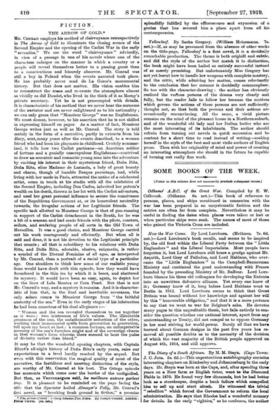FICTION.
.rti.E ARROW OF GOLD.•
Mu. CONRAD employs.his method of clairvoyance retrospectively in The Arrow of Gold to illuminate the closing scenes of the Second Empire and the opening of the Carlist War in the early " seventies." We use the word " clairvoyance " advisedly, in view of a passage in one of his novels where one of the characters enlarges on the manner in which a country or a people will reveal themselves better to a passing guest than to a conscientious and leisurely observer. Mr. Conrad was still a boy in Poland when the events narrated took place.
He has probably never read de La Gorse's monumental history. But that does not matter. His vision enables him to reconstruct the scene and re-create the atmosphere almost as vividly as did Daudet, who lived in the thick of it as Morny's private secretary. Yet he is not preoccupied with details.
It is characteristic of his method that we never hear the surname of the narrator and are never enlightened as to his nationality ; we can only guess that "Monsieur George" was an Englishman.
We must demur, however, to his assertion that he is not skilled in expressing himself on paper. As a matter of fact, Monsieur George writes just as well as Mr. Conrad. The story is told mainly in the form of a narrative, partly in extracts from his diary, sent,many years after the events described, to a woman friend who had been his playmate in childhood. Crudely summar- ized, it tells how two Carlist partisans—an American soldier of fortune and a genially unscrupulous Englishman—contrived to draw an eccentric and romantic young man into the adventure by exciting his interest in their mysterious friend, Doha Rita, Delia Rita, alias Madame de Lastaola, a lady of great beauty and charm, though of humble Basque parentage, had, while living with her uncle in Paris, attracted the notice of a celebrated artist, come in touch at his studio with all the celebrities of the Second Empire, including Don Carlos, inherited her patron's wealth on his death, thrown in her lot with the Carlist adventure, and used her great personal influence to secure the connivance of the Republican Government at, or its benevolent neutrality towards, the irregular actions of her Legitimist friends. The specific task allotted to Monsieur George is that of gun-running in support of the Carlist detachment in the South, for he was a bit of a seaman and had made friends with the pilots, coasters, sailors, and seafaring people of all sorts in the Old Town of Marseilles. It was a good choice, and Monsieur George carried out his work courageously and efficiently. But when all is said and done, it is not his devotion to the Legitimist principle that count/3; all that is subsidiary to his relations with Doha Rita, and Doffs Rita, adorable, elusive, enigmatic, is rather a symbol of the Eternal Feminine of all ages, as interpreted by Mr. Conrad, than a portrait of a racial type of a particular age. One shudders to think how some of our realistic young lions would have dealt with this episode, how they would have floundered in the thin ice by which it is beset, and shattered its mystery. It would have been so easy, again, to depict her on the lines of Lola Montez or Cora Pearl. But that is not Mr. Conrad's way, and a mystery it remains. And it is character- istic of him that, in the final and inevitable severance, the only solace comes to Monsieur George from " the faithful austerity of the sea." Even in the early stages of his infatuation he had been conscious of his dual allegiance :— " Woman and the sea revealed themselves to me together as it were two mistresses of life's values. The illimitable greatness of the one, the unfathomable seduction of the other, working their immemorial spells from generation to generation, fell upon my heart at last : a common fortune, an unforgettable memory of the sea's formless might and of the sovereign charm in that woman's form wherein thwy seemed to beat the pulse of divinity rather than blood."
It may be that the wonderful opening chapters, with Captain Blunt's all-night history of Dona Rita's early years, raise our expectations to a level hardly reached by the sequel. But even with this reservation the magical quality of most of the narrative, the fastidious and unerring distinction of the style, are worthy of Mr. Conrad at his best. The Ortega episode has momenta which come near the border of the undignified. But then, as Vauvenargues said, lea leseilleure mimes patient trop. It is pleasant to be reminded on the page facing the title that the Spectator hailed Abnayer's Folly, Mr. Conners first novel, as " breaking fresh ground in fiction," a promise
• The Armee of Gold : a Story between Two Notes. By Joseph Conrad. London Mier Unedn. use, atd4
splendidly fullilled by the efflorescence and expansion of a genius that has secured him a place apart from all his contemporaries.


































 Previous page
Previous page